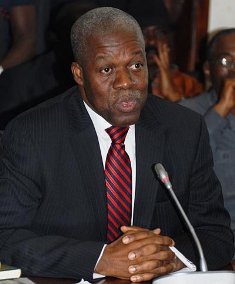Vice President Paa Kwesi Bekoe Amissah-Arthur on Thursday said there was the need for countries to work closely with drug producer and consumer regions for the world to deal effectively with drug trafficking.
He said Ghana is not alone in facing problems of drug trafficking, and therefore would continue to collaborate with the ECOWAS, the African Union and the United Nations to enhance its ability to respond to threats of the drug trade.
The Vice President stressed the need to receive accurate information about drugs, adding, ”we must make every effort to ensure that our youth are given the kind of help that reduces their vulnerability to drug pushers and diminish the risks they run in using drugs.”
Vice President Amissah-Arthur said this when he addressed the inaugural ceremony of the West Africa Commission on the Impact of Drug Trafficking on Governance, Security and Development, held at the Kofi Annan International Peace Keeping Training Centre, at Teshie, in Accra.
The Commission was established by the Kofi Annan Foundation, in consultation with international and regional partners, national governments and civil society organizations, in response to the dramatic surge in drug trafficking through West Africa over the past decade.
The Commission is chaired by former President Olusegun Obasanjo of Nigeria, and the members are a group of distinguished West Africans, including President Pedro Verona Pires o f Cape Verde.
Vice President Amissah-Arthur said the Government of Ghana welcomes the initiative, which was taken by former UN Secretary General Kofi Annan to raise awareness of the negative impact of drug trafficking in the sub-region.
He said the initiative comes at a crucial time when the countries in the sub-region are facing the threat of sustained instability due to the destructive activities and corrupting influence of drug traffickers.
Vice President Amissah-Arthur said West Africa had become a significant point for the trafficking of drugs from South America to Europe and some estimates suggest more than a third of the drugs that go to Western Europe have West Africa as point of entry.
The Vice President said:“The value of the drug trade is a significant proportion to our national GDP. It therefore has the ability to undermine national institutions. The profits from the drug trade can fund and corrupt national institutions and subordinate them to the will of the traffickers.
“Drug trafficking is thus a great threat to the well-being, security and stability of our countries.”
Vice President Amissah-Arthur noted that the percentage of substance abusing patients using cocaine, heroin and pethidine appears to have grown substantially over the last five years, and the ingestion of drugs by injections has grown, heightening the risk of HIV transmission.
Also the UN Office of Drugs and Crime suggests that in 2009 locals consumed about a third of the South American cocaine shipped through West Africa, and this situation, the Vice President said, was a concern since the consumption of illicit drugs in the West African sub-region creates serious problems of dependency, with further burden on health services.
While acknowledging the several fronts Ghana has taken to deal with the threats posed by drug trafficking, the Vice President called for more to be done, and gave the Commission the assurance that the Mahama Administration will lend full support to its work.
Mr Kofi Annan said the massive surge in drug trafficking over the last decade presents a serious and growing threat to the region’s stability and development.
“Left unchecked, illegal drug trafficking could compromise the encouraging progress that West African Nations have made in strengthening democracy and promoting human and economic development,” he added.
Former President Obasanjo said the illegal trade in drugs could cause political instability and social upheavals.
“The trade in illegal drugs has already caused devastation in other regions of the world. We must all work to prevent West Africa from experiencing the same fate. The Commission looks forward to its urgent and important work,” he said.
The Commission, which will publish a comprehensive report later this year, aims to develop evidence based policy recommendations for political and civil society leaders to address drug trafficking, mobilize public awareness and political commitment around the issue and promote local and regional capacities to deal with drug trafficking.
Regional News of Thursday, 31 January 2013
Source: GNA
Veep stresses collaboration in fight against drug trafficking

















